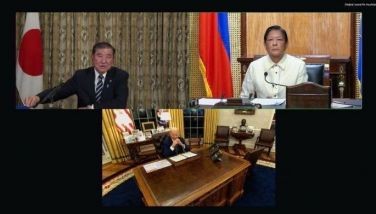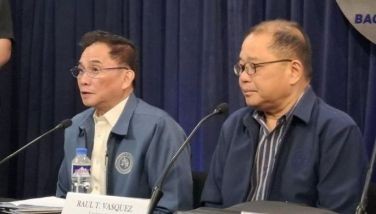Australia commends AFP for victories vs terrorists
January 30, 2007 | 12:00am
ZAMBOANGA CITY — The Australian government lauded the Philippine military yesterday for the latter’s success in neutralizing the leadership of the al-Qaeda-linked Abu Sayyaf, which is sheltering Jemaah Islamiyah (JI) terrorists in Sulu.
Australian Ambassador Tony Hely congratulated Western Mindanao Command chief Lt. Gen. Eugenio Cedo during his visit here.
"I have expressed my congratulation for the way the efforts against the (Abu Sayyaf) have been maintained, which led to the demise of (Abu Sayyaf chieftain Khadaffy) Janjalani and (spokesman) Abu Solaiman," Hely told newsmen after emerging from a closed-door briefing at the military headquarters in this city.
Hely also encouraged the military to continue its security operations to neutralize terrorists, including JI militants hiding with the Abu Sayyaf.
The military recently said there are reports indicating that Asia’s most wanted JI bomber, Dulmatin, was wounded during an encounter last Jan. 16 with Army Special Forces in Talipao. The reports are still being validated.
Dulmatin, an electronics engineer, reportedly masterminded the 2002 bombing of Bali, Indonesia with Umar Patek. The bombing killed 202 tourists, most of them Australians and Europeans.
Cedo assured Hely that the military has not stopped searching for the remaining members of the Abu Sayyaf and the JI.
"We will not stop the operation until all these wanted people who threaten the peace are all taken to account so everybody will live in freedom from fear," Cedo said.
Hely said his government has continuously worked with the Philippines to counter terrorism, and he described the two countries’ long-standing cooperation program as "working well."
According to Hely, his government is spending some $10 million to $30 million to build up the Philippines’ capacity in law enforcement and its maritime, port, border and immigration security programs.
"I think we are tough in the fight against terrorism because Australia, like the Philippines, has been (a victim of) terror," he said.
Hely also assured the Philippine government that they are reviewing the travel advisory it issued last year, warning of possible terrorist attacks in Cebu that would coincide with the original schedule of two international summits, which were postponed last December and staged early this month.
Summit organizers said the summits were postponed due to a tropical storm that was to hit the central Philippines.
"We are certain the travel advisory is on review," Hely said when asked by newsmen if the Philippines’ recent success in neutralizing the Abu Sayyaf leaders would prompt Australia to change its travel advisory.
Hely noted that travel advisories are part of each government’s program to ensure the security of its nationals. He added that Canberra has travel advisories on 152 countries, and the advisories deal not only with security issues but also other concerns such as typhoons, health problems and outbreaks that Australian nationals may encounter in these countries.
Hely also visited United States military forces here for the Balikatan joint military exercises and then talked with local officials, led by Zamboanga City Mayor Celso Lobregat.
He also inspected this city’s port, which is part of the Australian government’s program to upgrade the security of all Philippine ports.
Hely also said Australia will double its developmental programs in the southern Philippines to ensure peace and security in the region.
He said that of the $70 million Canberra spends every year as part of a six-phase program of aid for other countries, about 60 percent or more than $40 million goes to Mindanao.
Among the programs supported by the Australian government is the floating school ship, a program of the Western Mindanao State University. Hely said part of this program is to provide livelihood and skills training to residents.
Hely said Australia provides $35 million for the Moro National Liberation Front peace agreement through the United Nations multi-donor funds.
He said it is establishing 160 peace development zones in the conflict areas in the southern Philippines and will provide money for the World Bank trust fund for the Moro Islamic Liberation Front (MILF) peace agreement.
"And if we anticipate if the agreement is signed, we would be a major donor to that process as well," Hely said.
Peace talks between the government and the MILF started on Jan. 7, 1997, but gained momentum only four years ago with the participation of Malaysia as "third party mediator."
The government is in the final stages of peace negotiations with the MILF. The talks, however, are in the most difficult stage because negotiators on both sides are threshing out the issue of ancestral domain, or which areas in Mindanao are to be declared Moro homeland.
Australian Ambassador Tony Hely congratulated Western Mindanao Command chief Lt. Gen. Eugenio Cedo during his visit here.
"I have expressed my congratulation for the way the efforts against the (Abu Sayyaf) have been maintained, which led to the demise of (Abu Sayyaf chieftain Khadaffy) Janjalani and (spokesman) Abu Solaiman," Hely told newsmen after emerging from a closed-door briefing at the military headquarters in this city.
Hely also encouraged the military to continue its security operations to neutralize terrorists, including JI militants hiding with the Abu Sayyaf.
The military recently said there are reports indicating that Asia’s most wanted JI bomber, Dulmatin, was wounded during an encounter last Jan. 16 with Army Special Forces in Talipao. The reports are still being validated.
Dulmatin, an electronics engineer, reportedly masterminded the 2002 bombing of Bali, Indonesia with Umar Patek. The bombing killed 202 tourists, most of them Australians and Europeans.
Cedo assured Hely that the military has not stopped searching for the remaining members of the Abu Sayyaf and the JI.
"We will not stop the operation until all these wanted people who threaten the peace are all taken to account so everybody will live in freedom from fear," Cedo said.
Hely said his government has continuously worked with the Philippines to counter terrorism, and he described the two countries’ long-standing cooperation program as "working well."
According to Hely, his government is spending some $10 million to $30 million to build up the Philippines’ capacity in law enforcement and its maritime, port, border and immigration security programs.
"I think we are tough in the fight against terrorism because Australia, like the Philippines, has been (a victim of) terror," he said.
Hely also assured the Philippine government that they are reviewing the travel advisory it issued last year, warning of possible terrorist attacks in Cebu that would coincide with the original schedule of two international summits, which were postponed last December and staged early this month.
Summit organizers said the summits were postponed due to a tropical storm that was to hit the central Philippines.
"We are certain the travel advisory is on review," Hely said when asked by newsmen if the Philippines’ recent success in neutralizing the Abu Sayyaf leaders would prompt Australia to change its travel advisory.
Hely noted that travel advisories are part of each government’s program to ensure the security of its nationals. He added that Canberra has travel advisories on 152 countries, and the advisories deal not only with security issues but also other concerns such as typhoons, health problems and outbreaks that Australian nationals may encounter in these countries.
Hely also visited United States military forces here for the Balikatan joint military exercises and then talked with local officials, led by Zamboanga City Mayor Celso Lobregat.
He also inspected this city’s port, which is part of the Australian government’s program to upgrade the security of all Philippine ports.
Hely also said Australia will double its developmental programs in the southern Philippines to ensure peace and security in the region.
He said that of the $70 million Canberra spends every year as part of a six-phase program of aid for other countries, about 60 percent or more than $40 million goes to Mindanao.
Among the programs supported by the Australian government is the floating school ship, a program of the Western Mindanao State University. Hely said part of this program is to provide livelihood and skills training to residents.
Hely said Australia provides $35 million for the Moro National Liberation Front peace agreement through the United Nations multi-donor funds.
He said it is establishing 160 peace development zones in the conflict areas in the southern Philippines and will provide money for the World Bank trust fund for the Moro Islamic Liberation Front (MILF) peace agreement.
"And if we anticipate if the agreement is signed, we would be a major donor to that process as well," Hely said.
Peace talks between the government and the MILF started on Jan. 7, 1997, but gained momentum only four years ago with the participation of Malaysia as "third party mediator."
The government is in the final stages of peace negotiations with the MILF. The talks, however, are in the most difficult stage because negotiators on both sides are threshing out the issue of ancestral domain, or which areas in Mindanao are to be declared Moro homeland.
BrandSpace Articles
<
>
- Latest
- Trending
Trending
Latest
Trending
Latest
Recommended
January 13, 2025 - 12:00am






























